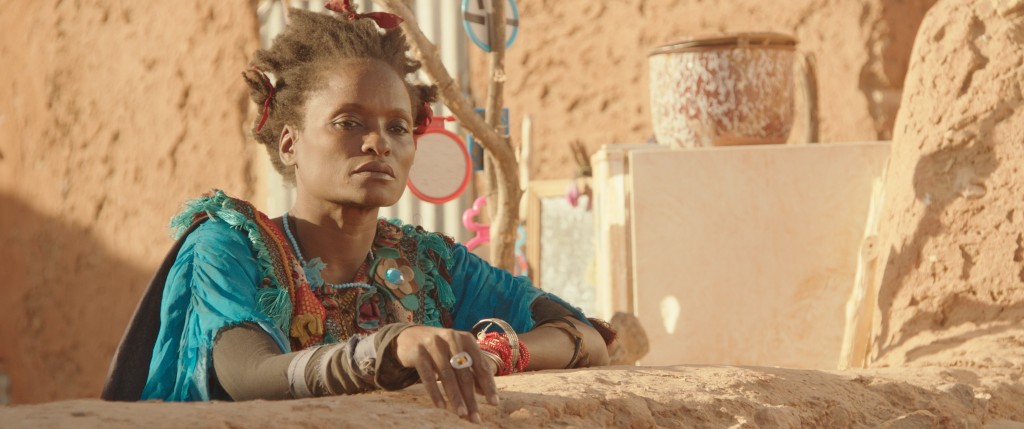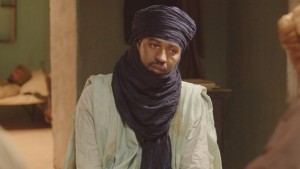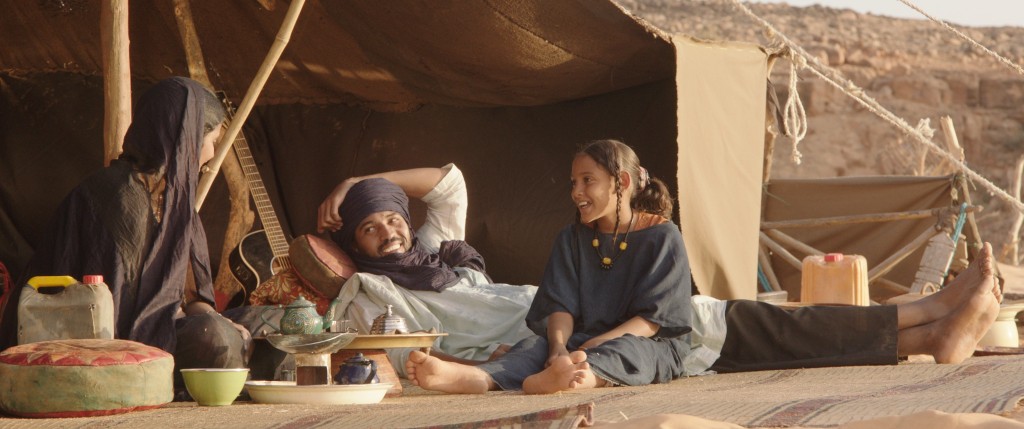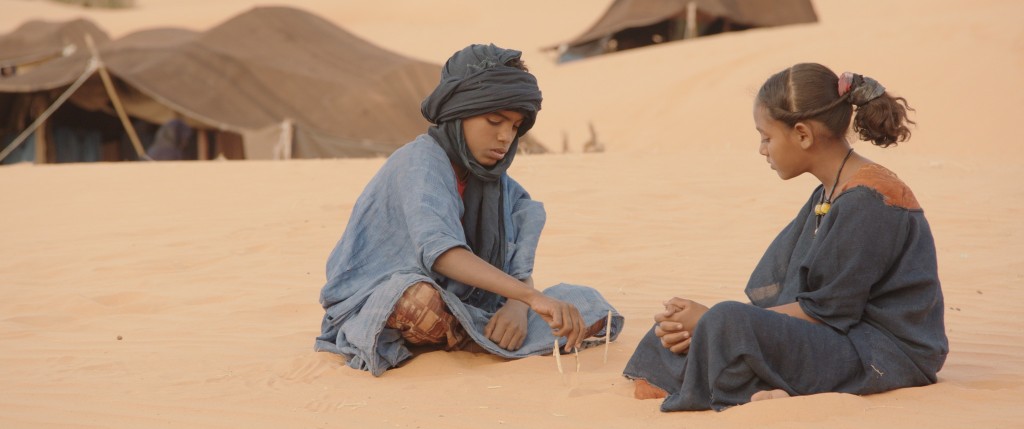On Saturday night, I had the rare opportunity to do what I love to do.
I invited a room full of Christian writers and special guests to travel with me to a village on the southern edge of the Sahara Desert in West Africa. It’s a perilous place: Islamic extremists — carrying out jihad against anyone who offends them, including their fellow Muslims — patrol the streets carrying machine guns and shouting out long lists of things that transgress their understanding of god’s law. Women must wear socks and gloves. No one is allowed to play music or sing. Adultery carries a death sentence.
We were anxious and uncomfortable, to say the least. But we were there.
 We were there by the transporting power of filmmaker Abderrahmane Sissako. In truth, we never actually left beautiful and rainy Whidbey Island, which lies between the Olympic Peninsula and Western Washington State. But as we watched Sissako’s film Timbuktu, we had the enlightening opportunity to tour this village, visit a cattle farm, and observe clashes between the wise and the ignorant over how to interpret the Koran and honor God.
We were there by the transporting power of filmmaker Abderrahmane Sissako. In truth, we never actually left beautiful and rainy Whidbey Island, which lies between the Olympic Peninsula and Western Washington State. But as we watched Sissako’s film Timbuktu, we had the enlightening opportunity to tour this village, visit a cattle farm, and observe clashes between the wise and the ignorant over how to interpret the Koran and honor God.
These Christian writers — Catholics and Protestants alike, members of The Chrysostom Society, including such accomplished writers as Luci Shaw, James Schaap, Harold Fickett, Jeanine Hathaway, and Matthew Dickerson — determined to wait until the next day to discuss the film, allowing this intensely affecting film to work on our minds and hearts before plunging into conversation. But on Sunday afternoon, we gathered in a circle for an hour to share impressions, reactions, and questions.
This is what I love to do with friends, with students, with artists: To gather before challenging art, look closely, contemplate, interpret, discuss, learn, and then carry our epiphanies with us back into our lives in such a way that they season our opinions, our behavior, and our priorities.
(And you can join the discussion too. Share your thoughts or questions regarding Timbuktu in the Comments below, or on the Looking Closer Facebook page here.)
Here are ten of the many things that the Chrysostom Society pondered and discussed after watching Timbuktu: images that moved us, characters who surprised us, moments of musical inspiration, unanswered questions.
The opening shot.
A gazelle is running. But there is no sound at all. Until…
In retrospect, why does this startling scene serve as such a meaningful opening?
The image of two men struggling to get out of a lake.
A bright swath of gold sunlight reflected off of water. Two silhouettes, two men moving in opposite directions. During this long shot, we hold our breath, for we know that we are watching a turning point in the history of this troubled community. The image stays with us. Why is it so effective?
The village imam.
This holy man bravely and boldly argues with the jihadis, demanding that they leave this place of prayer and worship. He stands up for women and their rights. He calls the whole concept of “jihad” into question, directing the militants to carry out jihad in their own hearts, rooting out immorality there before concerning themselves with the morality of others. How does this compare to Jesus’ own teachings about morals and judgment? Consider… the issue of stoning will come up before the movie is over. What did Jesus say to those who gathered to stone a woman accused of adultery?
The women and their sufferings.
One woman is ordered to wear gloves even as she’s preparing fish at the market. Another is arrested for singing. Another is arrested for adultery. A married woman is approached by a jihadi while her husband is away. A stranger asks a woman for her daughter’s hand in marriage, and when he is refused, threatens to take her by force “in a bad way.”
Do all of the Muslims agree on how they should be treated? What does that tell us about Islam?
That flamboyant woman with the rooster.
Is she a prostitute or a “day wife” for the extremists? Is she a witch, performing voodoo in order to manipulate the soldiers? She comes from Haiti, and she makes mysterious references to the events that brought her to this village. What is her role in the city? Why do the extremists respond to her the way that they do?
The video-production scene.
A young Muslim man is directed to make a speech in a video for the jihadis. He is reluctant, and lacks passion. He is supposed to condemn Western culture. He is expected to condemn rap music, saying he has chosen God over music. And yet, he is being filmed with digital cameras and spotlights. What are we to take from this scene?
The bouncing soccer ball.
Arguably the film’s most beautiful sequence, a football game is captured with graceful cinematography, capturing the joy and imagination of the young men as they engage in spirited play. But the whole sequence is bittersweet, for they are pushing the limits of what their armed guardians will allow, and they can’t even use a real ball. Meanwhile, the ball that has been confiscated goes bouncing through the village, and no one will step in to pick it up for fear of what condemnation might fall on them.
How the man brought before a judge responds during his trial.
Even though the circumstances of a violent encounter are ambiguous and complicated, a condemned man accepts his “fate” without struggle.
Why?
What does this suggest about concepts of justice within Islam?
Technology.
A child raises a cell phone to the sky. What does this repeated image mean to you?
That masked man…
Who is he — that character on a motorbike who frequently rides through the town? He remains masked. And in the film’s nerve-wrackingly climactic conclusion, he plays an important role.
I brought Timbuktu to this group because I knew that they were unlikely to encounter the movie any other way. But I also knew that, being accomplished writers and artists, they are observant, attentive, and intuitive in their interpretations of what they see, hear, and read. I wanted to learn from them. I had already seen the movie, read about it extensively, and written about it. But I was able to see so much more through their questions and conversation.
How else would we have ended up having such a substantial discussion about our Muslim neighbors, those abroad and those here in America? None of us are likely to find ourselves in any of these villages any time soon — at least, not together, not in circumstances where we would be free to discuss the correlations between Muslim communities and Christian communities, the points of theological agreement and disagreement?
In the days after the screening, I received several thank you notes from the writers, which I wish I could forward directly to the filmmaker himself, since he was the one to make such a brave work of art..
One wrote, “Thanks so greatly for bringing the film along and talking so eloquently about it. It has to rank as one of the most difficult films I’ve ever seen, one I’ll not forget soon — and therefore one of the finest. It was a joy to talk about it with you and the others.”
Another said, “Thank you for introducing us to this film. Deeply disturbing and profoundly necessary.”
And another asked for a list of recommendations of films set in Iran, Iraq, and other places where Islam is the primary faith. “That film will stay with me for the rest of my life,” he said.
This was just one gathering, just one film, just one discussion. But it felt to me like my most important and rewarding film-related event of the year. It gave us practice in listening to, and learning to love, our neighbors. It helped us confront, wrestle with, and begin to overcome some of our misconceptions about those who believe differently than us.
And in this current political climate, when the two leading Republican candidates both promise to “carpetbomb” people like this “until the sand glows,” Christians need to consider how such statements clash with Christ’s call to love our enemies, to pray for those who persecute us, to seek justice, to love mercy, and to walk humbly with our God.
When we watch a movie like this, we are reminded that such people as these are not merely our neighbors — they are our family. We should be seeking reconciliation, not destruction. When we harden our hearts toward them, the behavior that results only increases their hatred toward us and their will to destroy us. The Gospel of forgiveness, peace, and reconciliation is the only answer that gives us hope.
Long, long ago, the sons of Abraham all worshipped the same God. But then, like three brothers born on the same mountain, they went their separate ways, had their separate journeys, and ended up with profoundly different perspectives on that mountain. Christians, Jews, and Muslims have very different ideas about God… but they all look back at the same mountain from different places.
They have different impressions of what kind of mountain it is, and what their responsibility is in relation to that.
But they look to the same mountain. We are family. And, as Christ taught us, we must love one another, tender-heartedly, forgiving each other. And if it costs us our lives, remember — Christ has overcome death. If we truly believe in him, then our enemies have no way to threaten us, because death has already been defeated, and we are safe in the inclusive and welcoming love of our God.
First Impressions of Timbuktu
Here are some notes I made at Letterboxd after my first viewing of Timbuktu.
I’m tempted to give it 5 stars, but I don’t like doing that after just one viewing. My enthusiasm may be compromised by the timeliness of this film. We need intimate portraits of those faithful to Islam, and those unfaithful to it. We need them right now. And here we have one. I’m grateful.
Does that mean it’s a masterpiece? This is my first experience with filmmaker Abderrahmane Sissako. I’m moved by the narrative, the performances, the patience, the complexity, and the beauty. But I’m not sure I see Sissako as a director who composes meaningful images so much as he is a storyteller who knows how to film a good story. I’d like to see more visual poetry on the screen. I need to think this over and read some more. I need more time.
But I’m confident in my sense of its greatness. My most reliable source of thoughtful film reviews, Steven Greydanus at Decent Films, agrees with me.
Here is what Timbuktu caused me to ponder:
When any religious law ceases to be a way of showing us that we all, falling short of righteousness, need God’s love and mercy…
When any religious law is bent to stifle the playful, free, and creative (and thus human) expression of love and worship…
When any religious law ceases to be a design that helps human beings support one another in equality and love…
When any religious law seeks to concentrate power in the hands of a few, instead of investing power in service of those who lack power…
When any religious law becomes a system that people can manipulate, exploit, and revise to their own advantage…
… then that law no longer has anything to do with God. (That is to say, with Love.) Unjust religious law, or good religious law that is manipulated and abused, divides instead of uniting, kills community instead of building it, diminishes the humanity of those in power, and makes saints out of the oppressed for what they suffer.
In this film, the aging Muslim leader who speaks knowledgeably about the desire for peace, pleading on behalf of those who suffer injustice, clearly has roots running deep into faith. Those who oppose him, quoting the same sacred texts, are clearly self-interested and narrow-minded. They cherry-pick verses that will support their cause, disregarding the fuller interpretation of the text.
This is a very specific film about specific cultures clashing in a specific time and place. But it looks so much like what happens in any religion or tradition — even the one in which I find the meaning and richness and joys of my life. I have seen behaviors like those of the violent extremists in this film among Christians. Christianity, like Islam, is always full of professing followers of Christ who ignore anything in Christ’s teaching and example that is inconvenient for their agenda. Many are prone to seizing the law that was given for human flourishing and then bending it to exalt and protect themselves. They forget that Christ presented himself as the fullest revelation of the law — and he did that by abdicating conventional forms of power, investing himself in service of the poor, the marginalized, the outcasts.
The fruit of the Spirit, the Bible says, are love, joy, peace, patience, kindness, goodness, faithfulness, gentleness, and self-control. Where we see these things cultivating one another, Love is alive. And God is Love. In that sense, we can see God at work in the Timbuktu narrative: He is there in the love a family, in the resistance to forces that divide, in the language of those who speak truth in love, in the joy of the music, in the grace of the children.
Thus, I must object to those who just throw up their hands and say “The world would be better off without religion.” Any signs, any vocabulary, any code — “secular” or “religious” (if you believe those things are exclusive, which I don’t) — can be distorted and subverted for evil purposes. Love is the question that must be posed to any belief to test its quality; and love is the answer that this question demands.
Timbuktu stands out among films about Islam and Islamic extremism by making everyone involved — traditionalist and extremist, irreligious and religious, loving families and arrogant tyrants — human, rather than caricatures. When an audience is persuaded of a character’s humanity, the audience will connect with that character — whatever their culture, class, or gender. We identify with humans who suffer and with humans who abuse power. Thus, in its human specificity, Timbuktu becomes more relatable, and less likely to be judged simplistically, than so many films about our age.
We all, wherever we live, whatever religion we claim or deny, find ourselves shaken by the same warring impulses: within religions, organizations, communities, families, marriages, and even within our individual hearts. Thus, I think Timbuktu is a great film for everybody — so long as it is watched attentively and discussed.



